Interviews
Gerry Anderson
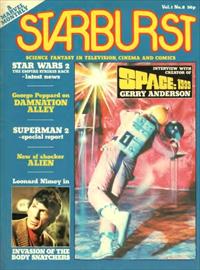
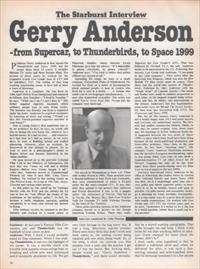
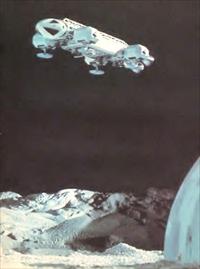
Starburst Number 8 (April 1979) interview by John Fleming p22-27
From Supercar to Space: 1999 Gerry Anderson has led the field with television science fiction. In this interview Anderson talks to Starburst about his life and career, from his very early days in the British film industry to the present.
Producer Gerry Anderson is best known for Thunderbirds and Space: 1999, but his career dates back 23 years; it includes thirteen TV series and three feature Alms. For sixteen of those years, he worked for the expansive (Lord) Lew Grade, boss of ATV and its subsidiary ITC. The ending of that long working relationship seems to have left at least a trace of bitterness.
Anderson is a Londoner. He was born on 14th April 1929 in West Hampstead and educated in Kilbum, then Neasden - "I lived in Neasden," he says. "What can I say? I can't deny It." His father supplied cigarette machines which ordinary people kept in their living rooms. The business was literally ran from a cupboard under the stairs. Anderson Sr acquired customers by knocking on doors and asking, "Would you like this French-polished cigarette machine in your house?"
One of young Gerry's first ambitions was to be an architect. In fact, he says, he would still like to design his own house but, whenever he's had the money he's had no time... and whenever he's had time he's had no money. In his early days, he went to Building School and studied plastering. However, after an accident, he discovered he was allergic to plaster. So he went to work in a photographer's studio in Regent Street and became interested in the visual medium.
He soon moved on to the post-war Colonial Film Unit at the Ministry of Information. He says that was "when we still had a British Empire - Before Lew Grade bought it all". After that, Anderson moved to Gainsborough Pictures (at what is now BBC Lime Grove Studios). He worked in the cutting rooms on The Wicked Lady, So Long at The Fair, Jancey, Caravan and various other movies.
At this point, he was called up for National Service with the RAF and (he claims) his IQ was so low he "was offered the choice of the cookhouse or the military police". In fact, he became a radio telephone operator, guiding aeroplanes in to land- this started his interest in flying.
After military service, he returned to the film industry and worked as a sound editor at Pinewood Studios, where director Lewis Milestone gave him the advice: "It's impossible to please everybody, so please yourself". Anderson says: "I've tried to follow that advice without any success at all."
Spreading his wings, he went to a small company. Polytechnic Films of Maidenhead. He worked for them on a series of documentaries about unusual people - A man in Austria who lived for a year in a bottle ... A woman who could type in ten languages simultaneously ... A man who hypnotised crocodiles. The series was called You're Never Seen This. No-one did; the company went bankrupt.
He stayed in Maidenbead to form A.P. Films with Arthur Provis in 1955. Their premises were a disused ballroom at Islet Park and, eventually, they were commissioned to make a 52-part series for the newly-created ITV. It was only after they agreed to the project that Anderson and Provis discovered it was to be a puppet series: The Adventures of Twizzle. This led on to Torchy The Battery Boy, then Four Feather Fails for Granada TV (with Nicholas Parsons as the voice of Tex Tucker).
These series proved a success, so the Anderson company moved to a factory on the Slough Industrial Trading Estate. There they made Supercar for Lew Grade's ATV. That was followed by Firehall XL-5, the only Anderson series to be networked in the US. Following that success. Lew Grade told Anderson, "I am going to buy your company". First series after the take-over was Stingray, which was also the first British TV series made in colour. Then there was the world-wide success of Thunderbirds. Followed by what Anderson calls the "tragic error" of Captain Scarlet - The heads and bodies were made in realistic proportion to each other, so the puppets stopped being caricatures and this, he thinks, was unacceptable to the viewers. Anderson's last two Supermarionation series were Joe 90 and The Secret Service. He then went into live-action with UFO, The Protectors and Space: 1999.
But, for all this success, Gerry Anderson is not a totally happy man. He's had great success and everyone can understand success. But he's also had sudden commercial failures which, to this day, he cannot explain. Also, three years ago. his marriage to Sylvia Anderson broke up. It happened between the two series of Space: 1999 - a show which must itself have been tiring because of the much-publicised production and front-office problems. Since then, in his own words, be has been "marking time". His company Gerry Anderson Marketing currently has the lucrative European merchandising rights to pop group Abba, Last year, he also made a Supermarionation TV ad Alien Attack for Jif Dessert Topping - the only ad he has done apart from three award-winning ones for Blue Cars (a travel agent) in the late 1950s.
Starburst interviewed Gerry Anderson in his office at Pinewood, the studios where be worked after National Service and where Space: 1999 was shot. He is a surprisingly quiet man who is very polite and whose apparent policy in interviews is to be as helpful, honest and open as possible. He talks quietly and reasonably slowly, as if choosing his words carefully. Presumably, he is a man made wary by a great deal of contact with media corporations. He worked with Lew Grade and ATV/ITC for sixteen years and, as he says, "sometimes it's better to be a big cog in a small machine, rather than a small cog in a big machine".
Interview conducted by John Fleming
Starburst: At last year's Fantasy Film Convention, you said Thunderbirds was the highlight of your career to date.
Anderson: Well. I think I would probably stand by that statement. When I was making Thunderbirds, it was not the highlight of my career. It was a terrible chore with horrible little puppets whose strings kept on breaking and whose eyes went cross-eyed and it constantly shortened my life. We got very little footage in the bag every day. It was a long, laborious, painful process. There were many Alms that didn't work and were weeks in the cutting rooms being repaired and new shots being made. So, at the time, 1 think my attitude was that puppets were a pain and the quicker I get out of this the better. But, looking back, people would say: "Gerry Anderson - Thunderbirds," and there would immediately be a crowd wanting autographs. That series brought me real fame. I think it did more for me than anything before or since.
Lew Grade changed his mind about the format, didn't he ?
I think really what happened is that he ordered a half-hour show and, when we delivered the pilot, it was such a fast-moving, unusual and action-packed show that he obviously screened it to a few people and somebody must have said. "What a shame it isn't an hour!" So he called me up and said; "Can you turn it into an hour .' And I said: "Look! We've completed the first one. We've got eight more shot. We've got about six more scripted! My God! But he has a marvellous way with him inasmuch as he puts his arm round you and he says; "Y'know, Gerry. I have such faith in you! I know that if I told you it meant a lot to me, you somehow or other would do it." How can you resist that ? So we did it.
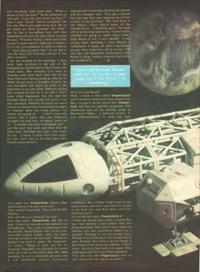
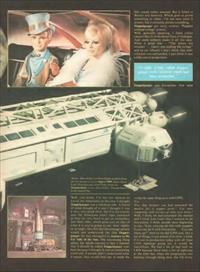
And the three US networks bid for it, but didn't screen it.
I was not present at the meetings. 1 have never been involved in the sale of the programmes and therefore I don't know the whole story. But certainly Lew went to America and came back with two of the three networks having made an offer for it. When he got back to London Airport, he was tannoyed and when he went to the telephone it was the other network saying they wanted to bid for it as well. I don't know what happened, but the deal fell through. Since this is going into print, I can only speculate. Whether he asked too much money or whether they had second thoughts or whether there are some politics I'm simply not aware of ... I don t know the reason, but I know that one network dropped out and then, of course, panic set in "I wonder why they've dropped out !" and the next one went and then bang all three went. And that was tragic. I say tragic for me I mean, it must have been tragic for Lew. Let's face it. he must have been bitterly upset about it
You made two Thunderbirds feature films which seemed to be successful.
They weren't successful. They were terrible failures.
How did they get financial backing?
Lew had made Thunderbirds Are Go on spec. United Artists saw it and picked it up immediately. They were so impressed with the picture. David Picker who, at the time, was with United Artists, when the lights went up turned to me and said "Whatever subject you want to make. Mr Anderson, it's yours." When it went out for its premiere, Piccadilly was blocked. It caused more of a stir in Piccadilly than the Abba premiere. It was a wonderful premiere and it was absolutely packed. Everybody cheered and I remember leaving the cinema and the manager said, "You get a picture like this and they start queuing up at four o'clock in the morning". We went back to the Hilton, where they'd made all the vehicles in ice a fabulous party. The head of UA at the time said to me. "1 don't know whether it's going to make more money than Bond or not. 1 can't decide ". I was sitting there (thinking I was) already a millionaire. I mean, all these experienced people; how could they all be wrong? The next day. the Dominion, Tottenham Court Road (a large London cinema) had about ten people in it.
How was it promoted?
Well, I made a film called Doppelganger with Universal which had lousy promotion. But, I've got to be fair about this, Thunderbirds Are Go was superbly promoted. The Dominion had all the vehicles made in fluorescent lights - a fantastic display. It was well-advertised. It went out over Christmas. But it failed. And I went to my local cinema and there were like five people in the hack row and three down the front and that was it.
So why did they make Thunderbirds 6?
I think the reason they made a second film was that nobody could believe that this thing had failed. They didn't know what the mistake was but somewhere there was a mistake. Perhaps it was the wrong story. Perhaps it was released at the wrong time of year. Perhaps they built it up too much in the minds of the potential audience. I don't know. Anyway, they had to try again. They tried again and the same thing happened.
Why did your film Doppelganger have its title changed for the American market?
Well, you know. I'm not too anxious to knock the Americans on this one. I thought Doppelganger was a fabulous title. A friend of mine thought of it and I thought it was a very, very good show, hut I'm not exactly sure the Americans aren't right inasmuch as they try very hard to get an immediacy into their titles, which gives you an idea of what it is you're going to see. And, rightly or wrongly, they felt that the average person would not understand the title Doppelganger. So they changed it to Journey To the Far Side of the Sun. The interesting thing about the whole exercise is that I insisted that it should be called Doppelganger over here because I thought it was an interesting word and. if people didn't understand what it meant, they would find out. It made the film sound rather unusual. But it failed in Britain and America. Which goes to prove something or other. I'm not sure what it proves, but it certainly proves something.
Doppelganger got nasty reviews. 'Puppets without strings' reviews.
Well, generally speaking. I think critics (pause) like to write clever lines of dialogue. And some subjects make it all too easy. What a great line - "The actors are wooden ... Gerry was pulling the strings" and so on. { Pause) I don't think that their criticism was unfounded, I just think it was wildly out of proportion.
Doppelganger was live-action . You were trying the same thing on TV with UFO.
Yes
Was that because you had saturated the market for TV puppet series? You were competing with re-runs of your own series?
Well, I think we had saturated the market and I think Lew knew that I wanted to do live-action. I think people were beginning to say, "Lew, you can do this with puppets, if you can do it with live-action ... You can clean up!" And so we did UFO and, like a lot of things, it was ahead of its time. I think if it was in production today with all these UFO sightings going on, it would be marvellous. We had a bit of bad luck on UFO because there were a lot of sightings at the time but, when the programme was halfway through being shot, the US Army Air Force issued the findings of an inquiry they'd been conducting for about two years. And they said categorically there are no UFOs. It did tend to kill interest in the subject for quite a long time.
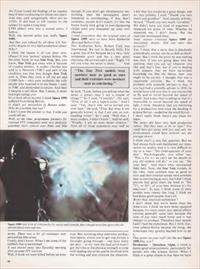
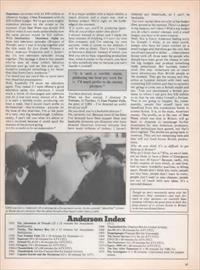
UFO almost went into a second series, I believe.
Well, the second series was really Space: 1999.
And that was refused by all three US Networks despite its very high production values. Why?
I think the reason is all too clear now. (Pause) It was 'serious' science fiction. On the other hand, so was Star Trek. But, you know. Star Trek got away with it because of (studio) politics. A studio (Desilu) was sold to a network (NBC) and part of the condition was that they bought Star Trek with it. Then they took it off the air and 12,000 fans - who were probably the only people who watched it in the States - went to NBC and demanded its return. And then it became a cult show. But, I mean, it never had high ratings ever.
It's a show all on its own. I think Space: 1999 suffered from being British.
It didn't get networked in Britain either. Why do you think that was ?
I don't know the answer to that. I wish you could tell me.
Well, at the time, programme planners for regional ITV companies were very jealously guarding their control over films and film series. There was a lot of resistance over networking film series.
I really don't know. When I see some of the rubbish that is networked ...
It was shoved away into Saturday morning slots on some ITV stations.
Well, I think we were killed before we even started. If you don't get simultaneous networking, then the newspapers aren't interested in commenting; if they don't comment, people don't watch; it's like the hoola hoola bird going in ever-decreasing circles until you disappear up your own channel.
I read somewhere that the original stars of Space: 1999 were to have been Katharine Ross and Robert Culp.
Not Katharine Ross. Robert Culp was interviewed. We met in Beverly Hills. I'm a great fan of his because he's a very, very competent actor and has a very great charisma. He arrived and I said, "Right, I'll tell you, what the series is about ...'' And he said, "Look, before you tell me what the series is about, may I say a couple of things?" So I said, "Certainly". He said, "First of all, 1 am a superb actor." And I said, "Yes. that's why we've invited you over here." He said, "Fine. But what is not generally known is that I am also an outstanding writer". So 1 said, "Well that, I must confess, I didn't know". And he said, "Finally, I am an even better director." Now all of those statements may well be true. But, knowing what television production means, where you've got one picture a fortnight going through - one hour every ten days - in my view the lead artist hasn't got the time or the physical strength to cope with leading the series and be involved with the writing and also criticise the direction.
I felt that this would be a great danger and so, very politely, I said, "Thank you very much and goodbye". And, equally politely, he said, "Thank you very much. Goodbye." We didn't have any kind of argument. I respected his point of view. Whether he respected me, I don't know. But the interview terminated there.
Isaac Asimov criticised Space: 1999 for unscientific details. Did you take that seriously ?
Yes. I think that a show that is absolutely scientifically correct can be as dull as ditchwater. But I think the point he was making was that, if you are going deep into the universe, then you can say whatever you like and that's fine; but if you're dealing with subjects that we have up-to-date knowledge on, like the Moon, then you ought to be correct. I thought that was a reasonable criticism. But I think the problem with scientific advisers is that, if you had had a scientific adviser in 1820, he would have told you that it was impossible to fly and to travel beyond the speed of sound. And today they're telling us that it's impossible to travel beyond the speed of light. I think, therefore, they are inhibiting (to a production) and since the heading is science fiction - underline the word fiction I don't really think there's any place for them.
The series did have very high production values. Did they have to he so high? You could have got away with less and only the professionals would have noticed, not the average viewer.
I think that's a very fair question. But we had always built and maintained our reputation on quality and it is very difficult to say to a man: "Do three-quarters of your best". Psychologically, you either say, "This is for tv: we can't see the details so any old rubbish will do," or you say, "Do your best". And that's what represented their best. Now, the Star Trek models, in my view, were nowhere near as good as ours and their exterior scenes were nowhere near as convincing as ours, but I don't think anyone had given them the brief to "Do 75 or 50"„ of your best because it's for television". In fact, I think some of their models were twenty feet long. I think we had damn good people, that's all.
Better than American technicians ?
I don't think that we're better than the Americans. I think we were better equipped because, for many years, any special effects pictures generally came here because the rates of pay were much lower and it was cheaper to produce. Therefore their people hadn't had the experience. But I think that, once science fiction became the thing, the Americans very quickly learned how to do it.
That poster on your wall's for the new Space: 1999 film, is it ?
Destination - Moonbase Alpha, I think is damn good entertainment, particularly for people who like science fiction. What I think is a great shame is that here we have Superman on screen with its $50 million or whatever budget. Close Encounters with its $20 million budget. We've got some mighty expensive pictures on the screen at the moment. Even Star Wars was almost $10 million when it was made and probably now the same picture would be $25 million. With Destination - Moonbase Alpha we have two television episodes {Bringers of Wonder, parts 1 and 2) strung together and the title reads Sir Lew Grade Presents a Gerry Anderson Production and it doesn't say it's two television episodes strung together. The damage it does is that people who've seen all these (other) fabulous pictures now go and see that and say, "I would've expected something a bit better than that from Gerry Anderson."
I've heard you say you'd like to move more into theatrical presentations.
Well, hopefully I'll never see television again. That means if I were offered a good television series this afternoon I would crack a bottle of champagne and celebrate and do it and love every minute of it. But it is such a terrible strain, producing one hour a week, that I would much prefer to do theatrical - that is cinema - pictures. At the time of this interview, I'm at the point of a very, very big breakthrough. Unfortunately, I can't tell you what it's about or who's involved because it could spoil the chances of the picture going.
Is it for a studio or for an independent ?
It is a major subject with a major studio, a major director and a major star. And a fantasy subject. We're right on the knife-edge at the moment.
If it works out, you'll be producing again. Why do you produce rather than direct ?
I always wanted to direct and I made the fatal mistake of thinking if I start my own film company and I'm making my own pictures, when it comes to the director, I will be able to direct. That's how I hoped to become a director. Instead of which, you find you are so busy organising production that, when it comes to the crunch, you have to take somebody else on because you can't handle it yourself.
You have directed, though.
When we first started. I directed 26 Twizzles, 26 Torchys, 52 Four Feather Falls, the pilot of UFO - I've directed an awful lot of our stuff.
Do you think you're a bankable director ?
No, certainly not. Because most of the films I've directed have been puppet films and bankable directors are directors who have directed theatrical {cinema) pictures that have made millions of dollars. I haven't directed any theatricals, so I can't be bankable.
You were saying there are a lot of big-budget films around at the moment. There's a danger in big budgets,' isn't there ? With a big budget you do what's easiest whereas, with a small budget, you have to be more creative.
Well, this is Gerry Anderson feeling sorry for himself. I think, in an ideal world, people who have for years worked on a small budget and therefore got the very best out of each pound or dollar ... when science fiction took off, those were the people who should have been given the chance to take the big budgets and produce something really sensational. But business doesn't work that way. Americans are so much more adventurous than British people at the moment. They get the money and they arrive at London Airport with their sack containing $20 million and they're certainly not going to come into a British studio and say, "Can you recommend a British producer to whom I can give this $20 million to so that he can make himself a fortune. That is not going to happen. So. consequently, people like myself have not benefited from this tremendous boom in science fiction. It is, in the main, American money. The profits, as in the case of Star Wars, which was shot in Britain, will go back to America to encourage further investment for new American producers. British technicians have gained, but that's short-sighted. The profits are going back to America. They arc not remaining here and they will not fund future British productions.
Why do you think it's so difficult to get backing in Britain ?
Why do I think that is? Why, as we sit here, arc we likely to have a State of Emergency in the next 48 hours? Because, sadly, this lovely country of ours which, at one time, had so many wonderful qualities, is falling apart. People don't think any more; people are lazy here; people don't want to work; people don't want to take chances; people are out of touch with new ideas. It's a national disease.
Though we don't necessarily agree with Mr Anderson's final comments - and look forward to your opinions - we sincerely hope someone will have the good sense to back this great pioneer of TV science fiction in Britain in the not-too-distant future.
Space: 1999 copyright ITV Studios Global Entertainment
Thanks to Robert Ruiz